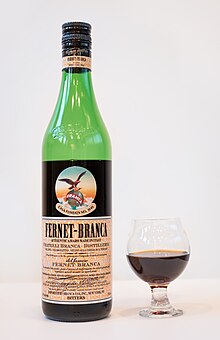Fernet-Branca (Italian: [ferˌnɛtˈbraŋka]) is an Italian brand of fernet, a style of amaro or bitters. It was formulated in Milan in 1845, and is manufactured there by Fratelli Branca Distillerie.[1]
 | |
| Type | Amaro or bitters (fernet) |
|---|---|
| Manufacturer | Fratelli Branca Distillerie |
| Country of origin | Milan, Italy |
| Introduced | 1845 |
| Alcohol by volume | 39% |
| Flavour | Bitter |
| Website | www |
History
editFernet-Branca was formulated in Milan, Italy, in 1845 by a self-taught herbalist, Bernardino Branca, who with his sons set up a business to manufacture and sell it.[2] It was marketed as a pick-me-up and as a cure for worms, for fever, for cholera,[3] and for menstrual pain.[2] From 1886 the company published annual calendars with works by well-known artists.[4] The eagle-and-globe logo was designed in 1893 by Leopoldo Metlicovitz.[5]
The company began exporting to Argentina in 1907, and in 1925 established a distillery in Buenos Aires.[6] In the United States the drink became popular after the passage of prohibition laws in 1919, as it was sold in pharmacies as a medicinal product.[7][2] By 1936 Branca had set up a branch office in Tribeca, New York, to satisfy American demand.[2][8] Production in the United States peaked at 60,000 cases in 1960.[2]
Formulation
editFernet-Branca is produced according to the original recipe of 1845.[9]: 36 [a] It is made from 27 herbs and other ingredients;[10] the exact formula is a trade secret. Sources have reported that its recipe includes Chinese rhubarb, Aloe ferox (bitter aloe), cinchona, chocolate,[11] quinine,[12] and angelica.[13] According to the Branca website, the drink contains " ... rhubarb from China, gentian from France, galanga from India or from Sri Lanka, (and) chamomile from Europe [or] Argentina",[14] as well as linden (Tiliae flos), iris, saffron, zedoary, myrrh, and cinchona.[15]
Fernet-Branca has a higher alcohol content, at 39%, and lower sugar content than most other amari.[16] It is aged in oak barrels for a year.[16]
The manufacturer also offers a sweeter, mint-flavoured liqueur, Branca Menta.
Consumption
editFernet-Branca is often consumed neat as a digestif, or as a mixing component (usually supportive and not as the primary ingredient) in cocktails such as the Toronto.[17]
In Argentina fernet con coca–Fernet-Branca with Coca-Cola–is a popular drink.[18][19] Some sources report that over 75% of all fernet produced worldwide is consumed there.[20]
In the United States it has been referred to as "The Bartender's Handshake".[16][21] It is estimated that 35% of all Fernet-Branca imported into the US is consumed in San Francisco.[22]
See also
editNotes
editReferences
edit- ^ Lichine, Alexis (1987). New Encyclopedia of Wines & Spirits (6th ed.). p. 233. ISBN 978-0304311248.
- ^ a b c d e f Cavalieri, Nate (7 December 2005). "The Myth of Fernet". SF Weekly. Archived from the original on 21 February 2007. Retrieved 11 April 2020.
- ^ Parsons, Brad Thomas (11 October 2016). Amaro: The Spirited World of Bittersweet, Herbal Liqueurs, with Cocktails, Recipes, and Formulas. Potter/Ten Speed/Harmony/Rodale. ISBN 978-1-60774-749-9.
- ^ "The "spirited" art of Fernet Branca's calendars". Italian Ways. 22 January 2014. Archived from the original on 29 January 2022. Retrieved 2 February 2021.
- ^ Times, Gordon Kendall Special to The Roanoke (24 September 2019). "Good Libations: The Curious Case of Fernet Branca". Roanoke Times.
- ^ "Frateli Branca Destilerías - Institucional". 31 May 2020.
Con las migraciones italianas de fines del siglo XIX llegó Fernet Branca a la Argentina. Debido a su gran aceptación, la compañía decidió en 1925 que la empresa Hofer & C. de Buenos Aires -concesionaria exclusiva para la venta del famoso "amaro" italiano- elaborara la bebida a partir del extracto enviado desde la casa matriz italiana.
- ^ Maier, Kathryn (27 December 2017). "Ten Fascinating Facts About Fernet-Branca We Learned During Its 'Storied Sips' Book Tour". Culture Truip. Retrieved 5 June 2020.
- ^ Beverage Media. Beverage Media, Limited. May 1999.
- ^ Gian Luca Margheriti (2015). 101 tesori nascosti di Milano da vedere almeno una volta nella vita (in Italian). Rome: Newton Compton Editori. ISBN 9788854186125.
- ^ Rathbun, A. J. (12 September 2007). Good Spirits: Recipes, Revelations, Refreshments, and Romance, Shaken and Served with a Twist. Houghton Mifflin Harcourt. ISBN 978-1-55832-336-0.
- ^ Maier, Kathryn (27 December 2017). "Ten Fascinating Facts About Fernet-Branca We Learned During Its "Storied Sips" Book Tour". theculturetrip.com.
- ^ Bruce-Gardyne, Tom (14 February 2017). "Fernet-Branca: a brand history". thespiritsbusiness.com.
- ^ Allen, Gary (October 2010). The Herbalist in the Kitchen. University of Illinois Press. ISBN 978-0-252-09039-4.
- ^ "Fernet-Branca". Fratelli Branca.
- ^ "The Secret Recipe". Fernet-Branca.
- ^ a b c "The Fuss About Fernet-Branca". Drink Spirits. 3 November 2013. Retrieved 28 April 2015.
- ^ Flack, Derek (23 August 2017). "Toronto's namesake cocktail is the best drink you've never had". blogTO.
- ^ Caro, Rebecca. "Argentinean Mixology: Fernet and Coke". From Argentina With Love. Retrieved 7 December 2016.
- ^ Zanoni, Elizabeth (21 March 2018). Migrant Marketplaces: Food and Italians in North and South America. University of Illinois Press. ISBN 978-0-252-05032-9.
- ^ Lahrichi, Kamilia (14 March 2017). "Argentina loves its Fernet, a bitter Italian liquor". CNN. Retrieved 16 June 2020.
- ^ Schuster, Amanda (12 September 2017). New York Cocktails: An Elegant Collection of over 100 Recipes Inspired by the Big Apple. Simon and Schuster. ISBN 9781604337297.
- ^ Reilly, Laura (26 August 2016). "Why San Francisco Drinks More Fernet Than Anyone in America". Thrillist.
- ^ "An Amaro That Will Make History". 17 July 2017. Retrieved 30 May 2020.
- ^ "Fernet-Branca: a brand history". The Spirits Business. 14 February 2017. Retrieved 12 April 2020.
- ^ Curtis, Wayne (1 November 2008). "The Bitter Beginning". The Atlantic.